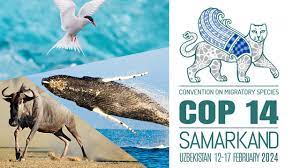Single Species Action Plan : CMS COP14

The 14th Conference of the Parties to the Convention on the Conservation of Migratory Species of Wild Animals (CMS COP14) adopted the Single Species Action Plan for the conservation of the Hawksbill Turtle.
- International Single Species Action Plan is the key instrument developed under the Agreement on the Conservation of African-Eurasian Migratory Waterbirds (AEWA).
- It is for the purpose of implementing coordinated measures to restore migratory waterbird species to a favourable conservation status.
- International cooperation among the species’ range states is essential for the implementation of these action plans.
- Agreement on the Conservation of African-Eurasian Migratory Waterbirds (AEWA) is an intergovernmental treaty dedicated to the conservation of migratory waterbirds and their habitats across Africa, Europe, the Middle East, Central Asia, Greenland and the Canadian Archipelago.
- It is developed under the framework of the Convention on Migratory Species (CMS) and administered by the United Nations Environment Programme (UNEP).
- It brings together countries and the wider international conservation community in an effort to establish coordinated conservation and management of migratory waterbirds throughout their entire migratory range.
- It covers 255 species of migratory waterbirds that are ecologically dependent on wetlands for at least part of their annual cycle.
- The Agreement area stretches from the northern reaches of Canada and the Russian Federation to the southernmost tip of Africa, covering 119 Range States from Africa, Europe, the Middle East and parts of Asia and Canada




